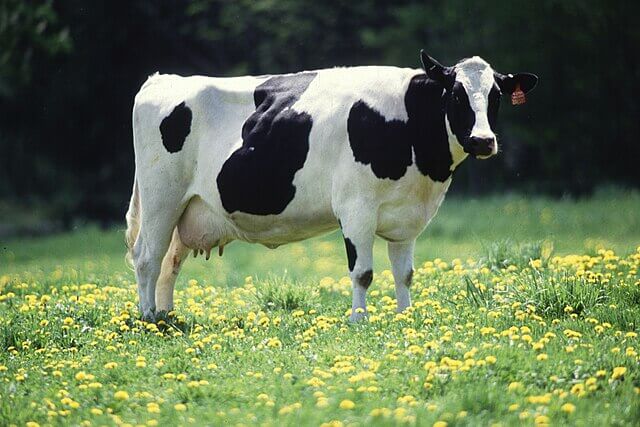
Addressing the environmental impact of dairy production, responsible for approximately 3.4% of global greenhouse gas emissions, has become a pressing issue.
In the idyllic Somerset countryside, where the Dairy Show has been an annual fixture for over 40 years, farmers are now grappling with the challenge of sustainable dairy farming.
The focus of this year’s Dairy Show was carbon, reflecting the industry’s evolving priorities.
David Cotton, one of the show’s organisers, said: “We are seeing reductions of 50% as farmers adopt better practices.”
Richard Clothier, the sixth-generation farmer at Wyke Champflower near Bruton, emphasises the shift towards environmental farming.
“We now measure the carbon emissions at every part of the farming and cheese-making process,” he explained.
“Looking after the environment is no longer optional, it’s a key part of the business,” he added.
At the heart of his operation lies a significant slurry pit, dubbed Wyke Farm’s “crude oil.” This waste is processed in large domes containing methanogenic bacteria, breaking it down and producing methane.
The captured gas serves various purposes, from heating milk in the dairy to warming farm buildings, and surplus methane is sold back to the national grid.
While Wyke Farms may be a standout example, similar sustainable practices are being adopted across dairy farms in the southwest of England. Rising costs for fertilisers and animal feed have prompted farmers to cut down on these inputs, leading to both cost savings and reduced carbon emissions.
Becky Wilson from Farm Carbon Toolkit emphasises the financial and environmental benefits of such practices, drawing a packed audience of farmers at the Dairy Show eager to learn about lowering costs and achieving a lower carbon footprint.
“Farmers are part of the solution.
“They have the ability to take carbon out of the atmosphere, and store it on our farms,” she said.
Independently validating this reduced footprint is crucial, given that many consumers place a premium on low-carbon products. Wyke Farms’ success in the United States, where its cheese has less than half the carbon cost-per-kilo compared to typical US cheese, exemplifies the market appeal of environmentally conscious products.
David Cotton, one of the organisers of the Dairy Show, said UK dairy farmers had a much better carbon story to tell.
“British milk and cheese produces about half the carbon of the global dairy industry,” he explained.
“Most cows here are grazing grass. Drinking rainwater.
“The muck goes round in a cycle. Compare that to an American feed-lot, where the feed and water is brought in, and the muck taken away, it’s not surprising we make less carbon.”
Despite the positive strides made by UK dairy farmers in reducing their carbon footprint, there is recognition that challenges persist. While a litre of British milk generates 1.25 kg of carbon, significantly lower than the global average of 2.9 kg, a growing number of consumers are opting for alternative milk products made from oats and soya due to even lower carbon emissions.
For farmers like Richard Clothier, striking a balance between sustaining a profitable business and minimising carbon emissions is now a critical challenge.
As the dairy industry grapples with evolving consumer preferences and environmental imperatives, the quest for low-carbon solutions has become not just an environmental endeavour but a vital business imperative.
——————————————————————————
At Natural World Fund, we are passionate about stopping the decline in our wildlife.
The decline in our wildlife is shocking and frightening. Without much more support, many of the animals we know and love will continue in their decline towards extinction.
When you help to restore a patch of degraded land through rewilding to forests, meadows, or wetlands, you have a massive impact on the biodiversity at a local level. You give animals a home and food that they otherwise would not have had, and it has a positive snowball effect on the food chain.
We are convinced that this is much better for the UK than growing lots of fast-growing coniferous trees, solely to remove carbon, that don’t actually help our animals to thrive.
This is why we stand for restoring nature in the UK through responsible rewilding. For us, it is the right thing to do. Let’s do what’s right for nature!
Donate today at https://naturalworldfund.com/ and join in the solution!

